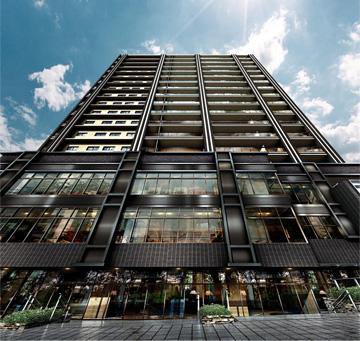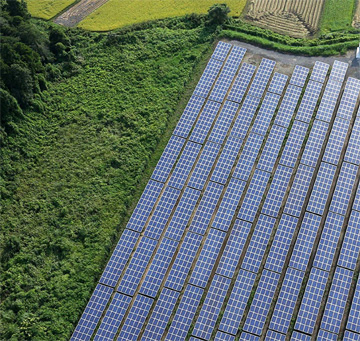Business

Business: 01
Real Estate Business
New built-for-sale condominium
Business Overview
The new built-for-sale condominium business, which we have developed across Japan through an integrated system covering everything from the acquisition of land to product planning and sales, is a core business accounting for more than half the units we sell on a consolidated basis. This business includes the mainstay LEBEN brand, which focuses on first-time home buyers, while the NEBEL series offers compact condominiums in urban areas. In the Tokyo metropolitan area, we mainly focus on units for single-family, single-person, and double income no kids (DINKs) households, and in regional city centers we concentrate our efforts around housing for active seniors.

Review of FY2024
For FY2024, the new built-for-sale condominium business
recorded net sales of ¥106,582 million (up 14.0% from the previous
fiscal year) and gross profit of ¥23,082 million (up 9.9%). The
gross profit margin fell to 21.7% (down 0.8 percentage points),
exceeding the initial plan by 0.9 percentage points. The new builtfor-
sale condominium business thus continued to play its role as a
core business for the Group, accounting for 54.2% of company-
wide sales and 54.6% of total gross profit.
The number of new built-for-sale condominiums sold stood at
2,339, an increase of 125 units from the previous year, marking a favorable shift. Steady progress was made on regional efforts to
strengthen the brand, and the business was able to maintain its
profit margin at a high level.
The Company provides units across the country, from
Hokkaido to Kyushu, with the 27% of units being supplied to the
Tokyo metropolitan area, and the Chubu area and Kinki area
accounting for 5% and 12%, respectively. Together, these three
metropolitan areas accounted for 44.1% of units supplied, up 9.9
percentage points from the previous year, with higher results in
the Kinki area in this period being of note.


Future Initiatives
Amidst a procurement environment where there have been sharp
increases in material costs as well as an acute labor shortage
causing similar increases in construction costs, sales prices in the
new built-for-sale condominium market have also trended
upward. On the other hand, real estate demand continued to
reflect customers’ high and persistent willingness to purchase
residences. As of the first quarter of FY2025, delivered units for
the entire fiscal year are projected to reach 2,820 units, with contracts
already finalized for 1,349, or 47.8%, of these units. This
means net sales are estimated to grow to ¥110,900 million, with
gross profit growing to ¥23,210 million.
In the domestic market, where population is increasingly concentrated
in the Tokyo area while regional cities face declining populations, we predict that the ratio of buildings in metropolitan
areas will grow to 44.5% (up 0.4 percentage points) in FY2025.
As for such issues as lengthening construction periods and
sharply increasing construction costs, we are responding through
cost controls, time controls, and high product standards. At the
same time, we have a policy of striving to maintain desirable price
levels as a partner for first-time home buyers.
With the number of domestic households continuing to decline,
it is estimated that the number of condominium units supplied will
fall as well. To sustain growth in such an environment, we make
careful selections when acquiring land and will provide our target
customer groups across Japan with more appealing condominiums
that are carefully designed to meet their needs.

Liquidation
Business Overview
The liquidation business is our second pillar of earnings in the Real Estate Business. This business draws on expertise cultivated within the new built-for-sale condominium business to help develop our diverse array of real estate assets. Specifically, this includes the high-grade rental condominiums “LUXENA” as well as residences, office buildings, and hotels. We have sold 60%– 70% of the properties developed to date to Takara Leben Real Estate Investment Corporation and support the company’s external growth.

Review of FY2024
As the market environment continues to be sound, beneficial
contributions from newly developed residences led to gross profit
of ¥7,375 million, which was 19.0% higher than initial targets.
We also promote the development of new products centered
on the LUXENA series, such as “LUXENA+ OTO MINAMI-SENJU,”
which was created to meet the demand for soundproof facilities.
In addition, steady progress has continued in efforts to increase
the value of our owned real estate and around leasing.
The amount we invested nearly doubled compared with the
previous period, growing to ¥49,270 million, due to the acquisition
at locations around Japan of superior assets matching
our investment standards.
We marked strategic progress by taking advantage of opportunities
provided by a sound real estate market, resulting in sales
increasing to ¥30,898 million. The gross profit margin improved far
beyond the initial target of 17.2% to 23.9%, contributing to stable
profit across the entire Group.

Future Initiatives
We will continue to actively acquire and develop assets nationwide.
To achieve the targeted level of expansion in the Takara Leben Real
Estate Investment Corporation’s asset scale, that is, increasing it
from the current ¥173.2 billion to ¥320.0 billion by March 31, 2031,
we strive to accurately assess demand in each area and carefully
select and secure investment opportunities.
With a focus on market trends, we will also challenge ourselves
to develop new concept products.
Regarding asset scale, as of March 31, 2025, we are holding
¥45,109 million* in assets in addition to owned assets undergoing
development that are valued at ¥17,704 million. The projected
value of these assets once development is completed is ¥33,333
million. Combined with existing assets this will bring total assets
held to ¥78,442 million. * Includes assets for liquidation that are included when calculating total real estate for sale

New detached house
Business Overview
Through Leben Home Build, we have established an integrated system in the new detached house business covering development, construction, and sales. At quality sites that are selected based on our own high standards—covering such factors as lifestyle convenience, educational environment, natural environments, and accessibility—we provide mainly mid-priced 4LDK residences. We also offer an expansive array of after-sale services and extended warranties that enable us to achieve the dual goals of offering “the ideal home that anyone can purchase affordably and with peace of mind” and “high quality at an accessible price point.”

Review of FY2024
Although only 217 units were sold, fewer than the 230 units
initially
planned, we saw progress generally in line with our plans.
Gross profit amounted to ¥1,501 million while the gross profit
margin came to 11.6%, both falling short of initial plans.
During the fiscal year, we promoted strategies aimed at
improving the synergistic effects of our brand and deepened
regional cooperation via business development in areas in and
around which the Group supplies condominiums.

Future Initiatives
We are working to distinguish our new detached houses business
from those of other companies by focusing on particular areas
when developing homes and applying a community-rooted
approach, with efforts centered on our LEBEN PLATZ series.
We are aware of the need to improve our market analysis capabilities
for individual areas; our hybrid investment strategies
designed in accordance with scale; and the structure of teams
that handle the execution of such strategies. By continuing to
enhance business development that accounts for regional
characteristics,
we seek to create stable, long-lasting structures
for supplying housing.
Renewal and resale
Business Overview
In the renewal and resale business, we focus on Tokyo and its three neighboring prefectures. We purchase second-hand condominium units that are about 30 years old with about 60 square meters of floor space to meet the needs of customers for preowned properties in highly convenient and favorable locations. Then, after the tenants have moved out, we renovate and resell them. We are also developing the Lé Art brand, where we acquire entire condominium buildings secondhand and utilize our design and planning capabilities to renew them.

Review of FY2024
Profitability improvements allowed us to surpass initial targets for total gross profit of ¥1,568 million. We have set the standard for average prices in each area, and efforts to raise the value of buildings to the level of “near newly built” have contributed to business performance. The gross profit margin was 14.9%, 2.5 percentage points better than initially planned.

Future Initiatives
At present, we do not expect a reccurrence of the bulk sales of multiple buildings seen in the first half of FY2025, so net sales are projected to fall. Because the price of purchases in the secondhand condominium market is continuing to rise, we are carefully proceeding with building acquisitions while paying close attention to the profitability of each property.
Real estate rental
Business Overview
The rent generated from properties the Group owns is the real estate rental business’s main source of income, and around 90% of these properties were acquired by the liquidation business or the renewal and resale business for the purpose of securing a lineup for the future. This business is also actively acquiring rental properties across Japan while striving to maintain high occupancy rates. Operations such as those related to rental property tenant acquisition are handled mainly by Leben Trust.

Review of FY2024
Soundness in rental apartments and office buildings markets led
to net sales of ¥6,229 million with a gross profit margin of 27.1%,
showing results that exceeded initial plans.
Inflationary trends in rent combined with enhanced occupancy
rates for our owned properties over long periods allow us to
steadily promote internal growth.

Future Initiatives
We will continue to supply products in exceptional locations centered on our specialty of floor plans for units sized 165 to 330 m2. In addition, we seek to further secure income by strengthening profitability through the enhancement of the value of currently held buildings (promoting internal growth) as well as by pursuing strategic asset exchanges in accordance with the market environment.
Real estate management
Business Overview
We manage a wide array of real estate assets, such as condominiums, rental residences, and office buildings, with Leben Community at the center of such efforts. Leben Community provides optimal management services ranging from everyday upkeep and maintenance to the planning of long-term repairs, building inspections, and proposals for large-scale repairs while maintaining dialogue with co-owner associations.

Review of FY2024
The gross profit margin declined slightly amid a rise in personnel
costs. Falling short of initial targets, the number of housing units
managed was 79,624, net sales were ¥9,623 million, and the
gross profit margin was 16.3%.
Although profitability was impacted by rising costs, the number
of housing units managed increased by 2,963 compared to the
previous period and the business base continued to steadily
expand. We expect to see measures to reduce costs and make
management costs more reasonable to begin yielding results
after FY2025.
Future Initiatives
Personnel costs appear to be continuing to rise, and we recognize
that enhancing management services and reducing costs are
both important management issues towards ensuring suitable
rates of profit.
High quality service capabilities secured through the provision
of training and certification systems is one of the Company’s
fortes. Through measures that include regular training and proficiency
tests, we have strengthened condominium managers’
business skills and ability to serve customers. We will further
refine our initiatives to educate human resources to enhance both
customer satisfaction and profitability.
Real estate and other
Business Overview
In the real estate and other business, we mainly provide real estate distribution services that include acting as an intermediary or sales agent when real estate is bought and sold. This entails utilizing our expertise and informational capabilities to formulate the most suitable proposals to meet the diverse needs of customers and may include anything from determining contract terms to organizing handovers. Our ability to utilize both our customer base and wealth of knowledge pertaining to buildings that we have gained through our various other businesses, in such areas as properties for sale, managed properties, and rental properties developed by the Group, comprises a huge point of strength within the industry.

Review of FY2024
Net sales rose to ¥1,674 million, 23.1% above the initial target, while the gross profit margin was 99.7%, 0.3% below the initial target. Despite these results being down from the previous fiscal year, we saw sound progress in terms of initial targets.
Future Initiatives
We will continue to utilize Group assets to their fullest extent as we strive for stable growth as a fee business. In FY2025, we expect that income from fees collected through acting as a sales agent will increase due to a higher number of joint ventures (JVs) in the new built-for-sale condominium business, and net sales are expected to expand by a factor of roughly 2.3 times from the previous fiscal year.

Business: 02
Energy Business
Business Overview
With operations centered on MIRARTH Energy Solutions, we promote the development and sales of electricity produced by power plants that utilize solar energy, wind, or other such renewable energy resources along with the operation and maintenance of such facilities, as well as biomass fuel conversion using cashew nutshells. In addition to the stable profit generated through the Feed-in Tariff (FIT) system, we are actively pursuing the expansion of these businesses through Power Purchase Agreements (direct energy purchase contracts with such entities as corporations or municipal governments) as we seek further growth in what has become the second pillar of our main business efforts after the Real Estate Business.

Review of FY2024
In FY2024, net sales fell by 21.9% from initial targets to ¥9,921
million while gross profit fell by 42.4% from initial targets to
¥2,551 million due to the considerable impact of a halt in sales
of power plant facilities. Factors that caused power sales to fall
short of plans included costs incurred in taking measures
against cable theft and repairs, but as these are temporary
effects we expect profitability to improve in FY2025.
On the other hand, power generation capacity expanded to
385 MW as of March 31, 2025, and we are making steady
progress. We are also currently expanding our portfolio with the goal of securing stable power sources, having acquired
the Hokkaido Otobe Power Plant (a wind energy plant) in
December 2024. This has given us a new power source that
is effective in the winter, when solar energy efficiency drops.
MIRARTH Energy Solutions has also entered into an on-site
Power Purchase Agreement (PPA)* with Yamanashi
Prefecture as of January 2025, as well as with the city of
Sapporo in February of the same year. Through these initiatives,
we continue to create a non-FIT business model.
* A contract for providing renewable energy generated within sites where there is demand
Future Initiatives
For FY2025, we do not anticipate any facility sales and will
focus on expanding our power generation capacity. For our
operational power generation capacity, we expect an increase
of 25 MW compared to FY2024, reaching 410 MW. We project
net sales of ¥11,670 million and gross profit of ¥2,950 million .
MIRARTH Energy Solutions is creating medium- to longterm
business plans and is enhancing its ability to generate
profits. We will actively invest in power storage sites and
accelerate our power facility development, with efforts
centering
on solar power plants. In addition, we will also seek
growth in new areas, including our cashew and fuel businesses.
As even comparatively cramped power storage sites can be
highly profitable, we will utilize the network we have cultivated
in our Real Estate Business to acquire land and optimally
distribute
the sites where such facilities are built.
In addition, in line with efforts to diversify our energy
sources,
we create a biomass power plant that uses wooden
chips as fuel. Compared with solar power facilities, the operation
and maintenance of biomass power generation facilities
is more difficult, and we are strengthening systems in pursuit
of stable operations.
Regarding the cashew and fuel businesses, we completed
construction of a cashew nut processing plant in Cambodia in
June 2024. Products manufactured at this site have been rated
highly, and we will continue with efforts that include the expansion
of processing and the cultivation of technical knowledge.
The 6th Strategic Energy Plan published by the Agency for
Natural Resources and Energy contains a policy to have
renewable energy account for 36%–38% of the energy generated
in Japan by 2030, and the Group recognizes this as an
opportunity for growth. As such, the Energy Business has
been positioned as our second pillar after the Real Estate
Business, and we will strive to expand business areas and
strengthen profitability.


Business: 03
Asset Management Business
Business Overview
Utilizing the wealth of expertise, knowledge, and networking capabilities regarding real estate and renewable energy accumulated by the MIRARTH HOLDINGS Group, we actively manage J-REITs and private funds. The Asset Management Business is handled by MIRARTH Asset Management and MIRARTH Real Estate Advisory. We respond to the diverse needs of investors by properly handling the unique attributes of specific investments as well as by providing them with excellent investment opportunities.

Review of FY2024
In FY2024, the formulation of a private fund greatly drove
performance, with net sales reaching ¥1,162 million, up
29.2% from the initial target. At ¥934 million, gross profit also
grew, up 33.5% from our initial target. Thus, performance
outstripped
plans by a wide margin.
In addition to expanding building acquisitions, we followed a
strategy of turning over assets through timely sales, leading
to steady growth.
The appetite for investments in Japanese real estate was
strong both at home and abroad, and performance remained
favorable thanks to a sponsor system that utilized the Group’s
planning capabilities along with our steady building procurement
capabilities. Through careful investments undertaken
with an eye to maintaining high levels of diversity in tenants
and high asset value in individual buildings, we continued to
acquire new buildings.
Assets under management (the value base for acquisitions)
totaled ¥311.3 billion, achieving the previous Medium-Term
Management Plan goal of ¥300.0 billion assets in assets
under management. This total breaks down into ¥77.9 billion
related to renewable energy, ¥173.2 billion related to REITs,
and ¥60.2 billion in the private fund.

Future Initiatives
We will continue striving to expand assets under management
and achieve steady internal growth as we strengthen
our management systems. A robust organizational foundation
is paramount when expanding assets, and the creation of
favorable office environments becomes an important issue
when securing and integrating exceptional human resources.
We believe that securing these human resources is as
important
as acquiring buildings, and we are focusing our
efforts on this goal.
Regarding capital increases, we are aware that there is an
impact on net asset value (NAV), but we adhere to a policy of maintaining a certain dividend level regardless of NAV.
As an investment manager, we are aware of our duty of
care and endeavor to ensure that our investment decisions
are well-considered and prudent. To this end, we conduct
careful examinations from the perspectives of profitability and
asset value before investing in properties projected to see
high levels of internal growth. This business’s duty is to
increase asset value through higher rents and enhanced
building values, and we will continue to contribute to the
growth of the Group’s stock fee business.

Business: 04
Other businesses
Business Overview
Group companies are involved in a wide array of other businesses,
such as the hotel business, the construction
business, and the caregiving business. In addition, the construction
business implements strict quality management
systems, including internal inspections of various processes
across multiple levels, and provides buildings for such various
uses as apartment complexes, welfare facilities, and retail
facilities.
Moreover, in the hotel management business, we
draw on the Group’s housing creation expertise and apply
knowledge related to comfortable spaces to the development
of the unique “HOTEL THE LEBEN” brand. In these and similar
ways, we seek to create new value by taking on the challenge
of expanding into new fields.

Review of FY2024 and Future Initiatives
Profit from other businesses was attributable to efforts
including construction contracts, hotel management, and
rehabilitation/day care services. Due to these efforts, net sales
amounted to ¥6,927 million (4.3% below the initial target) while
gross profit amounted to ¥373 million (58.9% below the initial
target).
Profitability was impacted due to rising costs in construction
and nursing care businesses, but the operation of our
managed hotels has produced favorable results, with gross
profit rising ¥348 million above that of the previous fiscal year.
We also received high ratings, including the acquisition of a
Michelin Key for our Nasu mukunone project in July 2024.
We expect occupancy rates and individual room prices
to remain high in our hotel management efforts and aim to
further enhance profit ratios. Strategies toward this end include accelerating the development of hotels specializing in
lodging accommodations as well as improving operations and
enhancing profitability among our existing hotels. We are also
promoting efforts to take charge of managing the hotels of
other companies as well as expanding the scale of our management
efforts, including via M&As. Through these efforts,
we aim to achieve an operating profit of ¥1 billion in FY2030.
